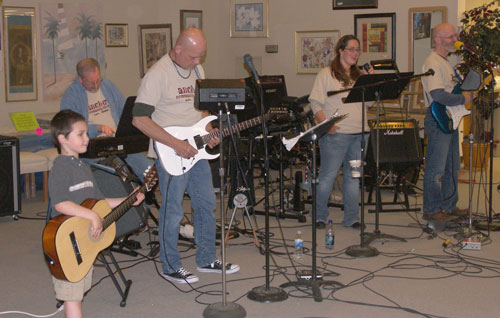Mom and Dad’s house. You can see them with Pam, especially if you click on the photo to enlarge it.
Pam and I spent the last two days helping Mom and Dad with their Memorial Day Weekend garage sale. We did three garage sales last summer, and will be following the same schedule this year–May, August, and October.
The four of us were selling not only for ourselves, but for my sister-in-law Joyce and her daughter, Paula. So it was a job tallying everything separately. But with a crack CPA running the cash register (well, okay, the legal pad with rulered columns), it was no trouble. At least, not for anyone but Pam.
Of the $1083 we made collectively, I made $187 and Pam made $139. So that was pretty good. But Mom took in the most money, thanks to her cookies, which she sells for 25 cents each in bags of 2 or 6. She made 58 dozen cookies, and all of them sold.
Mom’s cookies–peanut butter, sugar, and monster–are famous. People come early just to get cookies, which she bakes fresh and brings out to the garage as soon as they’re ready. We ran out by noon today, and all afternoon disappointed people stopped by to ask, “Got any more cookies?” People would buy cookies, move on to the next garage sale, and then, having dipped into their cookie bag, would return for more cookies. Happened over and over.
Oh, and let’s not forget the homemade noodles. Those went real quickly. We convinced Mom to raise her price, which was at $2.50 a bag last year. We suggested increasing a dollar, but she went with $3.00. People didn’t flinch. Didn’t even notice the price. They just saw noodles, started salivating, and grabbed a bag or two.
Probably a dozen other homes in the neighborhood also held garage sales. I toured the neighborhood once, checking out the other sales (and bought nothing, I’ll have you know). This is a neat neigborhood, located in a somewhat secluded area on Fort Wayne’s south side, near Waynedale. The neighbors are neighborly; they know each other, enjoy each other. Quaint.
Here are some of random observations:
- For some reason, the “professional” yardsalers who arrive while you’re still setting up–they annoy me. Hey, wait until we’re ready, you vultures.
- A large percentage of the people who come to Mom and Dad’s garage sales are Hispanic. Seemed like a much greater percentage this time.
- I favor a national moratorium on manufacturing mugs. Garage sales are littered with mugs people are trying to unload. We have enough. No more, at least for ten years or so, til we deplete the excess inventory.
- Quite a few Amish people came thorugh. Nice people. I was noticing footwear. Pretty much any footwear seemed okay, as long as it was black. And no open toes. Some women had slip-ons with open heels. Men all wore full shoes–no sandals or anything of the kind.
- I’m not a fan of dealing. None of us were. “Will you take 75 cents for this?” someone would ask, trying to knock 25 cents off an item that originally cost $25. No, we wouldn’t. The price that’s marked–that’s the price. Sure, we did some minor bargaining, but not much. Spoilsports.
- Several people remarked about how clean and organized our garage sale is. Mom is a garage sale commando. She doesn’t go to garage sales, but she loves holding them, and like the perfectionist she is, everything is in its place and properly marked.













